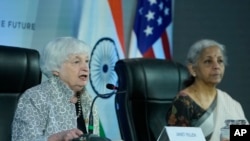G20 finance chiefs ended talks in India Tuesday with disagreement over Russia's war in Ukraine, limited progress on debt restructuring and warnings that divisions between rich and poor nations risked deepening poverty.
Many countries are still recovering from the coronavirus pandemic and drastic commodity price surges triggered by Russia's invasion of Ukraine, while climate change is affecting some of the poorest countries least able to cope.
The Group of 20 major economies failed to agree on a joint statement "because we still don't have a common language on the Russia-Ukraine war", but progress had been made on key issues, Indian Finance Minister Nirmala Sitharaman told reporters after the two-day summit of finance ministers and central bank governors in Gandhinagar.
The conflict in Ukraine created a devastating global economic impact sending food prices soaring, with diplomatic loyalties torn between Russia and the West.
"The world today is more shock-prone and fragile, with climate change, pandemics, and Russia's invasion of Ukraine all causing widespread turmoil," International Monetary Fund chief Kristalina Georgieva said Tuesday.
'Impact poorer nations'
US Treasury Secretary Janet Yellen on Sunday insisted redoubling support for war-stricken Ukraine was the "single best" way to aid the global economy, saying she would "push back" on criticism there was a tradeoff between aid to Kyiv and developing nations.
As talks took place, Russia refused to extend a deal on Monday allowing critical Ukrainian grain exports through the Black Sea, sparking outrage from the United Nations, which has warned millions of the world's poorest would "pay the price".
Sitharaman said that "several members" had condemned Russia's stoppage, while German central bank chief Joachim Nagel told AFP it had been "really strange" to have been "discussing how to help the vulnerable countries" as Moscow withdrew from the grain deal.
It will "likely to have an impact on food prices, which will more heavily impact poorer nations", South African Finance Minister Enoch Godongwana said.
Any discussion on Ukraine is awkward for India, which has not condemned Russia's invasion but is also part of the Quad grouping alongside Australia, the United States and Japan.
'Paying the price'
The new head of the World Bank said Tuesday that growing divides between rich and poor nations risked deepening poverty in the developing world.
"The thing that keeps me up at night is a mistrust that is quietly pulling the Global North and South apart at a time when we need to be uniting," Ajay Banga said Tuesday.
"The Global South's frustration is understandable. In many ways they are paying the price for our prosperity," said Indian-born Banga, a naturalised American citizen who took up the bank post last month after being nominated by US President Joe Biden.
"When they should be ascendant, they're concerned promised resources will be diverted to Ukraine's reconstruction, they feel energy rules aren't applied evenly, constraining ambition, and they're worried the grip of poverty will pull down another generation."
The World Bank said it is working to increase its financial capability -- including by raising hybrid capital from shareholders -- to spur growth and jobs, but said the future economy could not rely on expansion at the cost of the environment.
"The simple truth is: We cannot endure another period of emission-intensive growth," Banga said.
The United States says efforts to reform multilateral lenders such as the World Bank and other regional institutions could unlock $200 billion over the next decade.
Debt distress
G20 finance ministers also discussed multilateral development banks' reform, tax, cryptocurrency regulations and climate change adaption finance.
Debt restructuring deals for low-income nations were also a key focus.
China, the world's second-largest economy and a major lender to several stressed, low-income countries in Asia and Africa, has so far resisted any one-size-fits-all debt restructuring formula.
China's finance ministry said multilateral creditors should handle debt "in accordance with the principle of common action and fair burden", and that the G20 should "objectively analyse the causes of debt problems of vulnerable countries".
Several G20 suggested Beijing was reluctant on a deal, but Sitharaman called China's response "encouraging".
IMF chief Georgieva said the debt restructuring process "still needs to be speedier and more effective", adding that the costs of delay were being borne by those "least able to bear this burden".





